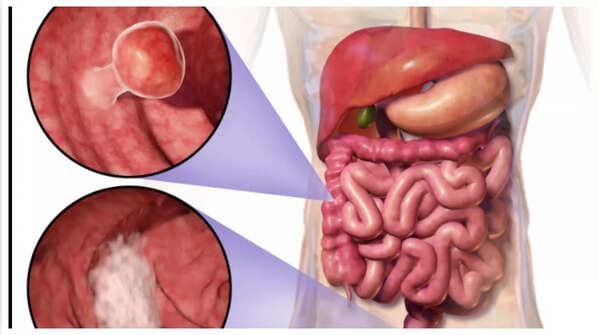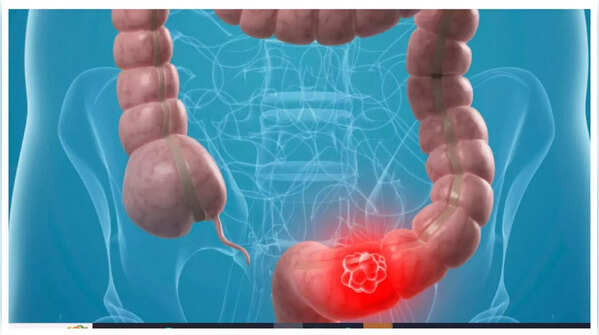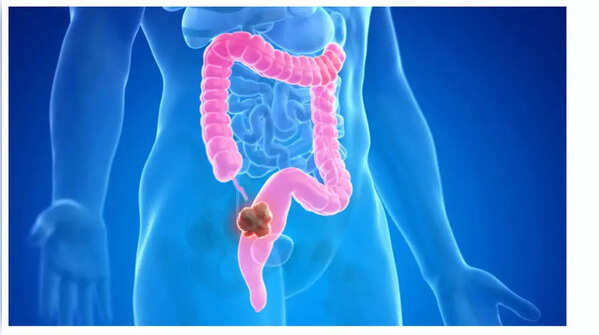Colon cancer, also known as colorectal cancer, originates in the colon or rectum, the final section of the large intestine. It frequently begins as small, noncancerous cell clusters called polyps, which can develop into cancerous growths over time. While most cases arise sporadically, factors like family history, obesity, and lifestyle choices can elevate the risk. The majority of diagnoses occur after age 50, and initial symptoms can be subtle, often mistaken for common digestive issues or stomach infections. However, certain warning signs warrant attention.
Here are five early indicators of colon cancer that are frequently overlooked:

A significant early sign of colon cancer is a noticeable alteration in bowel habits. This can manifest as:
These changes may appear insignificant or temporary, often attributed to diet, stress, or minor infections. However, persistent bowel changes lasting more than a few days or recurring frequently could signal colon cancer. These persistent changes suggest a potential tumor disrupting normal bowel function.

The presence of blood in stool should always be a cause for concern, regardless of whether colon cancer is suspected. It can appear as:
In some instances, the bleeding may be minimal and undetectable to the naked eye, potentially leading to anemia over time. While various conditions, such as hemorrhoids or infections, can cause blood in stool, it's crucial to rule out colon cancer, especially if the occurrence is recurrent or accompanied by other symptoms.

Persistent abdominal discomfort is another early symptom that is frequently disregarded. This may include:
Such discomfort can be mistaken for indigestion or other minor digestive issues, such as constipation. However, if the pain is ongoing and unrelated to dietary or lifestyle modifications, it could indicate a tumor causing irritation or blockage within the colon.

Experiencing unusual tiredness or weakness without an apparent cause can be a subtle indicator of colon cancer, particularly when accompanied by other symptoms. This occurs because slow, unnoticed bleeding in the colon can lead to iron deficiency anemia. When the body lacks sufficient red blood cells, it cannot transport enough oxygen, resulting in fatigue, shortness of breath, and weakness. While these symptoms may be dismissed as stress or lack of sleep, they warrant medical evaluation.

Unexplained weight loss is a common symptom across various cancers, including colon cancer. When the body is actively fighting cancer, the immune system operates at an accelerated rate, and tumors can disrupt digestion and appetite. If you experience significant weight loss without any changes to your diet or exercise routine, consulting a doctor is essential. While this symptom often appears in later stages, it can sometimes serve as an early warning sign.
Disclaimer: This article is intended for informational purposes only and does not substitute professional medical advice. Always seek the guidance of a qualified healthcare provider if you experience any of the aforementioned issues.
Newer articles
Older articles
 Moto G54 Gets Significant Price Cut in India, Making Budget Smartphone Even More Appealing
Moto G54 Gets Significant Price Cut in India, Making Budget Smartphone Even More Appealing
 Africa's Rift Valley: Mantle Upwelling Drives Continent's Split and Birth of New Ocean
Africa's Rift Valley: Mantle Upwelling Drives Continent's Split and Birth of New Ocean
 X Cracks Down: Over Half a Million Indian Accounts Suspended for Policy Breaches
X Cracks Down: Over Half a Million Indian Accounts Suspended for Policy Breaches
 Vijay Sethupathi Apologizes Amid Controversy Over Son Surya's Debut Film 'Phoenix'
Vijay Sethupathi Apologizes Amid Controversy Over Son Surya's Debut Film 'Phoenix'
 Jadeja's Accuracy Questioned: Ex-India Pacer Slams Spin Strategy in England Test Loss
Jadeja's Accuracy Questioned: Ex-India Pacer Slams Spin Strategy in England Test Loss
 IRCTC's AI Chatbot Revolutionizes Train Ticket Booking, Refunds, and Information Access
IRCTC's AI Chatbot Revolutionizes Train Ticket Booking, Refunds, and Information Access
 Ashada Gupt Navratri 2025: Unveiling Dates, Sacred Rituals & Hidden Significance of the Monsoon Festival
Ashada Gupt Navratri 2025: Unveiling Dates, Sacred Rituals & Hidden Significance of the Monsoon Festival
 Google Maps Enhances Directional Accuracy with Fused Orientation Provider Update
Google Maps Enhances Directional Accuracy with Fused Orientation Provider Update
 xAI to Open Source Grok, Democratizing Access to Musk's AI Chatbot
xAI to Open Source Grok, Democratizing Access to Musk's AI Chatbot
 Android Users Urged to Patch Now: Critical Security Flaws Expose Devices to Attacks
Android Users Urged to Patch Now: Critical Security Flaws Expose Devices to Attacks